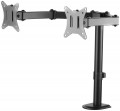Method of table mount installation (see "Type") to the tabletop.
This parameter is specified for those models that have additional devices for fixing on the table — a
clamp, a platform for
bolt-through mounting, or both. In addition, there are ordinary
stands that do not have fixing devices; they are as simple as possible to install and move from place to place, but they are not very reliable.
As for the different installation methods, their features are as follows:
— Clamp. Fixation with a clamp attached to the edge of the table. Clamps are more limited in their choice of mounting location than bolts — such a mount cannot be installed in the middle of a countertop. At the same time, such installation is much easier both during the initial installation and when moving the structure from place to place: there is no need to drill a table, preparing a place for bolts. And the limited choice of location is often compensated by an abundance of adjustments that allow you to set the optimal position of the screen. Due to this, clamps are the most popular in desktop mounts.
— Bolt-through mounting. Mounting with bolts through holes in the countertop. The main advantages of this option are reliability, as well as the ability to choose the installation point almost anywhere on the countertop. On the other hand, the installation procedure itself
...is quite complicated and involves permanent placement in one place, without moving — after all, it is necessary to drill holes for the bolts. Therefore, such a method of installation in its pure form is extremely rare nowadays — universal mounts have become more common (see below).
— Universal. Mounts that allows two mounting options described above at once — using a clamp to the edge of the countertop or using bolts. This design allows you to choose the best option. At the same time, it is technically easy to provide both a clamp and the possibility of bolt-through installation in one mount; therefore, most mounts with the possibility of using bolts are universal.The angle within which the screen installed on the mount can rotate. Rotation refers to turning around a horizontal axis perpendicular to the screen; see "Adjustments" for details. And the angle is usually indicated from one extreme position to another.
According to this parameter, two categories of mounts can be distinguished. In one of them, the rotation angle is small — about 10 – 15 ° — and this feature is mainly intended to compensate for inaccuracies made during the installation of the structure: even if the mount hangs slightly unevenly,
rotation allows you to set the screen straight. The second variety is models with a rotation angle of 180° and above (up to 360°); they allow user to rotate the screen from landscape to
portrait and vice versa.
Possibility
of placing the cables connected to the TV inside the rod or support of the mount(for ceiling and floor structures, respectively, see "Type"). This placement gives the whole structure a neat appearance, because cables, often of different sizes and colours, and even tangled with each other, are hidden from view and do not spoil the aesthetics.

